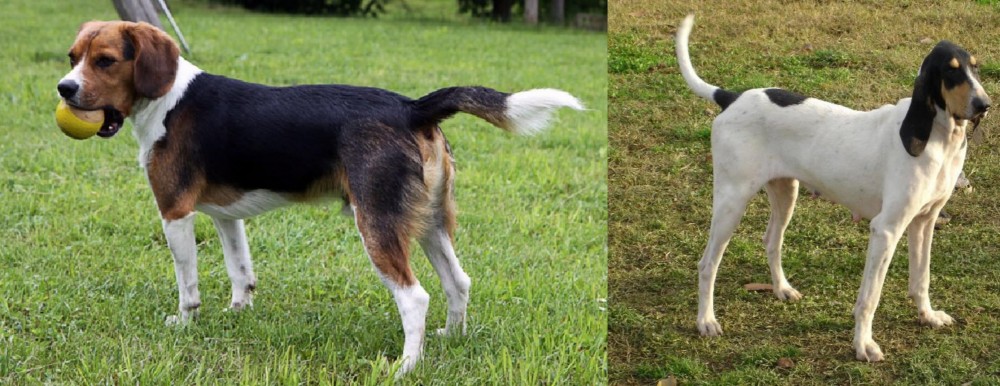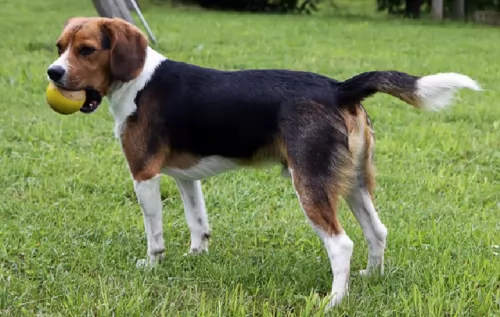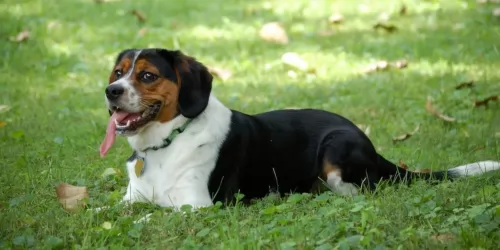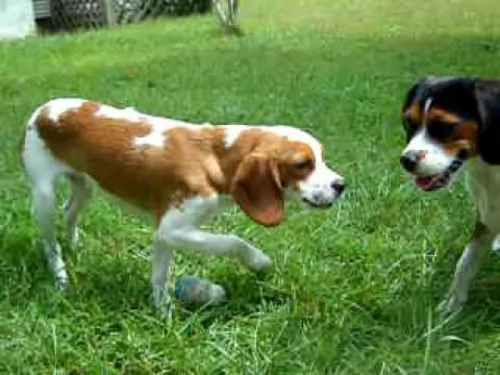 Petzlover
Petzlover Beaglier is originated from Australia but Petit Gascon Saintongeois is originated from France. Beaglier may grow 22 cm / 8 inches shorter than Petit Gascon Saintongeois. Beaglier may weigh 17 kg / 37 pounds lesser than Petit Gascon Saintongeois. Both Beaglier and Petit Gascon Saintongeois has almost same life span. Both Beaglier and Petit Gascon Saintongeois has almost same litter size. Beaglier requires High Maintenance. But Petit Gascon Saintongeois requires Low Maintenance
Beaglier is originated from Australia but Petit Gascon Saintongeois is originated from France. Beaglier may grow 22 cm / 8 inches shorter than Petit Gascon Saintongeois. Beaglier may weigh 17 kg / 37 pounds lesser than Petit Gascon Saintongeois. Both Beaglier and Petit Gascon Saintongeois has almost same life span. Both Beaglier and Petit Gascon Saintongeois has almost same litter size. Beaglier requires High Maintenance. But Petit Gascon Saintongeois requires Low Maintenance
 The Beaglier beginnings are set in Australia. Before around 30 years, breeders cross-breed the Beagle and the Cavalier King Charles Spaniel. The result actually turned out great – new we have a small sized breed with a wonderful, soft coat, very likeable looks, the calm and gentle dog which is very active despite his relaxed nature. They can be found around the globe nowadays and they are very popular because of their sweet nature.
The Beaglier beginnings are set in Australia. Before around 30 years, breeders cross-breed the Beagle and the Cavalier King Charles Spaniel. The result actually turned out great – new we have a small sized breed with a wonderful, soft coat, very likeable looks, the calm and gentle dog which is very active despite his relaxed nature. They can be found around the globe nowadays and they are very popular because of their sweet nature.
 The Petit Gascon Saintongeois comes from- and is in fact a smaller version of the Grand Gascon Saintongeois. The dog has been used for hunting. Hunters wanted a smaller dog and these were the Petit Gascon Saintongeois.
The Petit Gascon Saintongeois comes from- and is in fact a smaller version of the Grand Gascon Saintongeois. The dog has been used for hunting. Hunters wanted a smaller dog and these were the Petit Gascon Saintongeois.
There was a time when the numbers of these dogs became less and their numbers were restored by Baron Virelade in the 19th century. It is where this dog gets his nickname from.
The Petit Gascon-Saintongeois was recognized by the United Kennel Club on January 1, 1993.
 This small dog breed, called Beaglier and Beagler, has the look of his parents. Sometimes, they look more like the Spaniel, and sometimes they look more like the Beagle. This actually means that they are usually small, but can be, in some cases, even medium sized dog. They are usually tricoloured and in most cases, they have dark brown and cream hairs with white markings. They have longer ears, sometimes with more hairs if they look more like the Spaniel. They have large, dark brown eyes and usually dark nose. This breed is very loving and affectionate. They have a high need for a daily activity and they are the best choice for families with children.
This small dog breed, called Beaglier and Beagler, has the look of his parents. Sometimes, they look more like the Spaniel, and sometimes they look more like the Beagle. This actually means that they are usually small, but can be, in some cases, even medium sized dog. They are usually tricoloured and in most cases, they have dark brown and cream hairs with white markings. They have longer ears, sometimes with more hairs if they look more like the Spaniel. They have large, dark brown eyes and usually dark nose. This breed is very loving and affectionate. They have a high need for a daily activity and they are the best choice for families with children.
 The Petit Gascon Saintongeois is a smaller version of the Grand Gascon Saintongeois but he is still muscled and lean and looked upon as being a large, robust dog.
The Petit Gascon Saintongeois is a smaller version of the Grand Gascon Saintongeois but he is still muscled and lean and looked upon as being a large, robust dog.
His coat is short and dense and is white with black patches and some speckles. You'll find that there are nearly always black patches found on either side of the head, surrounding the eyes and covering the ears. The ears are essentially black, although there is also some tan coloring.
The ears are floppy, the tail long and saber-shaped.The Petit Gascon Saintongeois is a well proportioned dog standing at between 56 to 62cm in height and weighing 23 to 27kg.
The Petit Gascon Saintongeois is a friendly, good-natured pet, being loyal and loving with his human family and being a good playmate to children. He is also intelligent and amicable and will be easily trained and socialized.
 If you decide to bring a Beaglier to your family, it will be the best that you wait for your children to grow up a little bit. They are great to play buddy, but they get carried with the game and they can be very careless during the play. They fit perfectly with the children above the age of 5. They will run, jump, and do whatever your kid is about to do. They are friendly towards children they don’t know but they don’t do well with other animals they don’t know.
If you decide to bring a Beaglier to your family, it will be the best that you wait for your children to grow up a little bit. They are great to play buddy, but they get carried with the game and they can be very careless during the play. They fit perfectly with the children above the age of 5. They will run, jump, and do whatever your kid is about to do. They are friendly towards children they don’t know but they don’t do well with other animals they don’t know.
watchdog
One the main reasons why Beagliers are so much popular lay in their adaptability to any living conditions. They will fit in instantly in a family with children, but they will be happy as well if they live with just one person or even seniors. They can live indoors, houses and apartments without the yard. The Beaglier will enjoy the city parks, dog parks, beach, walking down the crowded streets. This breed is a not a quiet one – they will bark every time they notice something just to let you know. But, they are not aggressive type and they usually bark to communicate with people.
Usually, they are trained very easy. They have a stubborn nature, and if you learn how to get over with this temperament, you will be able to train and raise the sweetest dog ever. They should be trained and socialized while they are still puppies. Since they like too much, the best advice is to use treats to teach them everything that they will need to know. But, be careful with the feeding after the treats – Beagliers get easily obese if they are overfed.
 Your gentle, calm, amicable Petit Gascon-Saintongeois is such an excellent hunting dog, but he doesn’t let that get in the way of him being a wonderful family pet as well.
Your gentle, calm, amicable Petit Gascon-Saintongeois is such an excellent hunting dog, but he doesn’t let that get in the way of him being a wonderful family pet as well.
His friendly, good natured, docile temperament makes this particular breed a superb choice as he gets on so well with children too if they themselves have been taught to be kind to animals and to respect them.
He is intelligent too and easy to train, and he is attractive to look at as a bonus. This all makes him the kind of pet and companion that everyone could benefit from.
 The Beaglier flap ears can be a very great place for the fungi, bacteria and dirt. You will have to clean their ears with an ear cleaning solution and a soft tissue once a week, especially if your pet is playing outside.
The Beaglier flap ears can be a very great place for the fungi, bacteria and dirt. You will have to clean their ears with an ear cleaning solution and a soft tissue once a week, especially if your pet is playing outside.
Cherry eye: Starts as redness in the corner of the eye. Happens when the third eyelid gland slips out of its place and show up as a red blob in the corner of the eye. Sometimes, the gland gets back to its original place in a couple of days, but it will be the best if you can take your dog to the vet as soon as you notice any readiness in his eyes.
Glaucoma: Happens because of the high eye pressure. This affects the normal outflow of the eye fluids and can cause blindness if not treated. It is the best to for your beagle to regular eye checks since this condition is not easy to diagnose in the begging.
 The Petit Gascon-Saintongeois has no documented breed related health problems. As previously mentioned, with his long ears, check out the inside of his ears regularly for ear infections.
The Petit Gascon-Saintongeois has no documented breed related health problems. As previously mentioned, with his long ears, check out the inside of his ears regularly for ear infections.
Ticks fleas and worms are a curse. Worms particularly are terrible internal parasites and in fact some worms can even be fatal in puppies. Some of the signs your dogs may have worms include weight loss, a dull, dry, thinning coat, no loger interested in food, diarrhea and vomiting. The best way to respond to your pet’s worm issues is to get him to the vet.
This problem is looked upon as a medical emergency. Gastric dilatation and volvulus, if left, can kill your dog. It’s when gas is trapped in the stomach which has twisted, blocking off the stomach’s blood supply.
Deep chested dogs, feeding your dog just one meal a day so that he gobbles it up too quickly, and older, obese dogs are more prone to bloat. Your dog will require immediate veterinary intervention.
 If you are not sure about the dog food you should give to your Beaglier considering the living environment and the lifestyle, it is always the best option to listen to the vet’s advice. They are prone to the obesity so you should keep a schedule that won’t be changed much. Feed them every day at the same time, no more than two meals per day once they get older than 6 months.
If you are not sure about the dog food you should give to your Beaglier considering the living environment and the lifestyle, it is always the best option to listen to the vet’s advice. They are prone to the obesity so you should keep a schedule that won’t be changed much. Feed them every day at the same time, no more than two meals per day once they get older than 6 months.
If you want your Beaglier to be happy, make sure you groom him daily. You will need about 5 minutes per day to brush him and keep him out of the tangles. Bathe then once in a month, that will be enough. Clip their nails regularly. Keep their ears cleaned.
They need a daily activity or they will get destructive. Be careful with the feeding since they get obese very quickly.
Since they are natural hunters, they will like to play chase. You can take them to the woods for a walk or for a run but make sure you train them to respond to your commands before you take them off the leash. They are very curious and they will easily wander off. They can be taught to play inside the house as well. They love to explore new areas so it will be great if you can take them with you for a holiday.
 The Gascon Saintongeois is looked upon as being a fairly low maintenance breed. That is because the coat is short and smooth, although the coat does become thicker in the Winter time. He sheds so you will want to brush his coat at least twice a week.
The Gascon Saintongeois is looked upon as being a fairly low maintenance breed. That is because the coat is short and smooth, although the coat does become thicker in the Winter time. He sheds so you will want to brush his coat at least twice a week.
With his long floppy ears, during your brushing session, check inside his ears as dampness, wax and debris can become the ideal breeding spot for bacteria, and ear infections can be the result. Check for redness and possible discharge.
Check his eyes that they are clear and bright.
While brushing him, check for any new, unusual lumps.
Keep his nails well trimmed.
Provide him with a nice warm, dry spot to sleep.
When he’s oudoors, make sure that he has both sun and shade and that his waterbowl is always available.
Make sure that at the first signs of illness you get your pet to the vet.
Feed him only the best quality kibble there is. Occasionally give him some home-made food. Keep this food simple and nutritious. You can’t go wrong with boiled chicken, brown rice or pasta, sweet potatoes, carrots and spinach. You can chop this up and add it to his kibble. Sometimes it can benefit your pet to include some raw meat as well.
If only pet owners would realize that their pets don’t want all those spicy, exotic people foods. They just give a dog a stomach ache and eventually shorten his life. Make sure he always has access to a bowl of cool, fresh water.